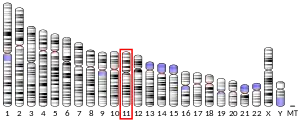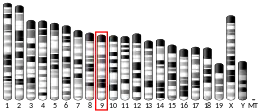Angiomotin-like protein 1
Angiomotin-like protein 1 is a protein that in humans is encoded by the AMOTL1 gene.[5][6]
Function
The protein encoded by this gene is a peripheral membrane protein that is a component of tight junctions or TJs. TJs form an apical junctional structure and act to control paracellular permeability and maintain cell polarity. This protein is related to angiomotin, an angiostatin binding protein that regulates endothelial cell migration and capillary formation.[6]
References
- GRCh38: Ensembl release 89: ENSG00000166025 - Ensembl, May 2017
- GRCm38: Ensembl release 89: ENSMUSG00000013076 - Ensembl, May 2017
- "Human PubMed Reference:". National Center for Biotechnology Information, U.S. National Library of Medicine.
- "Mouse PubMed Reference:". National Center for Biotechnology Information, U.S. National Library of Medicine.
- Nishimura M, Kakizaki M, Ono Y, Morimoto K, Takeuchi M, Inoue Y, Imai T, Takai Y (Feb 2002). "JEAP, a novel component of tight junctions in exocrine cells". J Biol Chem. 277 (7): 5583–7. doi:10.1074/jbc.M110154200. PMID 11733531.
- "Entrez Gene: AMOTL1 angiomotin like 1".
External links
- Human AMOTL1 genome location and AMOTL1 gene details page in the UCSC Genome Browser.
Further reading
- Hartley JL, Temple GF, Brasch MA (2001). "DNA cloning using in vitro site-specific recombination". Genome Res. 10 (11): 1788–95. doi:10.1101/gr.143000. PMC 310948. PMID 11076863.
- Bratt A, Wilson WJ, Troyanovsky B, et al. (2003). "Angiomotin belongs to a novel protein family with conserved coiled-coil and PDZ binding domains". Gene. 298 (1): 69–77. doi:10.1016/S0378-1119(02)00928-9. PMID 12406577.
- Wiemann S, Arlt D, Huber W, et al. (2004). "From ORFeome to biology: a functional genomics pipeline". Genome Res. 14 (10B): 2136–44. doi:10.1101/gr.2576704. PMC 528930. PMID 15489336.
- Patrie KM (2005). "Identification and characterization of a novel tight junction-associated family of proteins that interacts with a WW domain of MAGI-1". Biochim. Biophys. Acta. 1745 (1): 131–44. doi:10.1016/j.bbamcr.2005.05.011. PMID 16019084.
- Mehrle A, Rosenfelder H, Schupp I, et al. (2006). "The LIFEdb database in 2006". Nucleic Acids Res. 34 (Database issue): D415–8. doi:10.1093/nar/gkj139. PMC 1347501. PMID 16381901.
This article is issued from Wikipedia. The text is licensed under Creative Commons - Attribution - Sharealike. Additional terms may apply for the media files.




